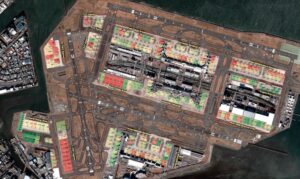Earlier this week, a BlackSky satellite flew to orbit on Rocket Lab’s Electron vehicle in a rideshare mission from New Zealand. With the additional eight satellites that will be launched later this year, BlackSky expects to have a total of 14 in operation.
Brian O’Toole, CEO of BlackSky, told SpaceNews that the eight satellites originally were planned to launch in 2022 but the company decided to speed things up. “We had an opportunity to align our satellite production with Rocket Lab’s production,” he said. “It all came together and allowed us to accelerate our deployment.”
The company is now launching Gen 2 satellites and is working on a Gen 3 version intended to have 50-centimeter resolution and short-wave infrared for low light and nighttime imaging capabilities. O’Toole said the company projects to have a constellation of 30 satellites in a few years.
Rocket Lab on March 22 launched BlackSky 7. O’Toole said the satellite starting collecting images within 24 hours of launch. The company uses artificial intelligence and machine learning to analyze pictures and other data.
BlackSky’s launches are booked by Spaceflight. Its satellites are made by its sister company LeoStella.
O’Toole said the company is not working exclusively with Rocket Lab and plans to use other launch providers. “Overall we look at the economics, and we look at who can get us where we want to be when.”
BlackSky last month announced plans to go public through a merger with a special purpose acquisition company called Osprey Technology Acquisition Corp. The deal is expected to close in July and BlackSky will be listed on the New York Stock Exchange with the ticker symbol “BKSY.”



